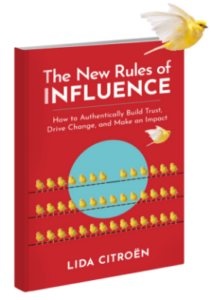Building a reputation takes care, consistency and focus. As I’ve said many times on this blog, your reputation is earned over time through your actions, behavior and the ways you align to the values you promote. When other people see a disconnect between what you say you believe and how you act, then distrust and suspicion build.


This is particularly relevant to how we behave online. I’ve heard people say they still feel a sense of anonymity online and believe they can promote a different persona to contacts they connect with in social media. In person you might be professional, but online you’re silly. Or, online you’re passionate about serving a community, but in person you don’t do anything to support these causes.
Being the same person online and in the flesh is important. If I see your LinkedIn profile, watch your YouTube video and read your blog and that information points to you as a leader in your field who is passionate and experienced, then I expect that to be the same person I meet. When I meet you and you lack confidence, insight and depth of knowledge, then I feel duped.
The online space is adamant about transparency. There are multiple examples of public outcry over CEOs posting comments using aliases, companies not responding to customer inquiries and business leaders sending mixed messages about their values and beliefs. Instead of trying to slide one past your online audiences, post what you know to be true, and tie all comments and thoughts to the brand filters to which you and your company adhere.
Some examples of social networking posts that can be troublesome:
- Years ago, I had a client who cancelled our meeting the morning of an important deliverable. I’d worked hours to prepare the materials and presentation to her senior executive team, and first thing in the morning I received this email: “Hi Lida. I’m so sorry to cancel, but I think I have food poisoning and am home in bed….”I understood her circumstances and wished her a speedy recovery. Imagine my surprise when I then log in to Facebook to find this post from her: “Decided to play hooky today! Hello spa pedicure…” accompanied by a photo of her soaking feet.
- My friend tells of interviewing a recent college graduate for a position in his firm. The candidate had excellent references and a well-prepared resume of experience. He did a simple Google search on her only to find her MySpace page from her college years. On the page were multiple photos of sorority gatherings, pool parties and Spring Break adventures. The photos showed her wearing very little clothes, drinking heavily and getting friendly with many other people. My friend decided the values of this candidate were inconsistent with the values and image of his firm and didn’t interview her. As he told me, “Anyone can create a well-designed resume.”
- Posting your political, religious, economic or societal frustrations and leanings can distance and repel certain audiences, too. One of my colleagues tells of a consultant he’d worked with for years who finally connected with him on Facebook. As the election neared, this consultant began posting racist and inflammatory statements about candidates, sometimes as jokes. While my colleague values free speech, the posts indicated another side to the consultant that was distracting and disturbing to him. This not only led to an “unfriend” situation but the end of a client relationship as well.
- A few years ago, I had an email dialog with a prospective graphic designer who wanted to work with me. I knew she was traveling abroad (we were connected online), so I mentioned that I would be interested in meeting with her when she returned from her travels and I looked forward to working with her. On Facebook, I saw this post from her, “I am so sick of people thinking I’m traveling on vacation. I’m working, people. If one more person suggests I contact them when I’m back in the States…”I felt terrible. I had misunderstood about her trip, and she’d publicly flogged me for it (thankfully not using my name). Instead of confronting her, I simply “Liked” the comment to acknowledge that I knew she was speaking of me, and I slithered away quietly, never contacting her again.
Building your personal brand online means being transparent, authentic and collaborative for most people. If you are going to say it online, then be comfortable saying the same in person, to someone’s face.



I have e-mailed this link to my 16 year-old daughter to let her know we’ll discuss it further over the weekend. =) It’s a topic we’ve discussed many times before but I think it will benefit her to see your article on the topic as well.
I also told her she has to send it to her friends too with a blind copy to me. hehehehehe It should be helpful for them to see that what they say and do online will impact them in the real world as adults, which is right around the corner…Ughhh! =)
Thanks again.
Thanks for sharing so much of your expertise.
I’m glad you enjoyed the post, Jennifer!
Hello Lida,
Interesting article. I really enjoyed it. As I’ve said many times, not everything is to be shared online. We all have fun and do things, but doesn’t mean we should share them. Also, when we have some bad experiences with colleagues or anyone else, posting it online is mainly because no one thinks about consequences.
53% of employers turn down job candidates because of the content they publish on social media (provocative or inappropriate).
44% of employers said it’s because the candidates used alcohol or drugs.
35% said it’s because the candidates vilified their employer or colleagues.
Everyone should read your post since young people do tend to post crazy stuff online.
King regards, Ratko Solaja.
Agreed. Thanks for sharing your insights, Ratko!